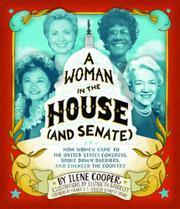"The answer was short and dismissive. Girls could not be pages."
 From Ilene Cooper's interview with Booklist in March, here is a bit about her YA nonfiction title A Woman in the House (and the Senate):
From Ilene Cooper's interview with Booklist in March, here is a bit about her YA nonfiction title A Woman in the House (and the Senate):
By the 1970s though, when women were demanding their rights instead of asking for them, many congressmen were growing hostile. When Patricia Schroeder was appointed to the Armed Services Committee, the chair made her and an African American, Ron Dellums, share a chair because, he said, "women and blacks were worth only half a member."
(Dellums was the first African American member of the committee.)
Cooper continues with this bit of her personal story about social security which BLEW ME AWAY:
The week before I graduated from high school, my mother died of a heart attack. The salary she earned as a saleswoman was intended to cover my college tuition--thankfully much less in those days. Still, after she died, it seemed college might not be in the cards for me.
Then my family learned that we were entitled to her Social Security benefits. A few years earlier, this would not have been the case. A husband's Social Security benefits went to his family; a wife's were simply put back into the general fund.
It took a dedicated congresswoman, Martha Griffiths of Michigan, to push for a bill that would reverse this injustice.
All rather startling, don't you think? You can see a short video of Congressman Dellums talking about sharing that seat by scrolling down on this Congressional history page.
[Post title taken from the response Cooper received when, as a teenager, she wrote to her Congressman asking about the Congressional page program.]




